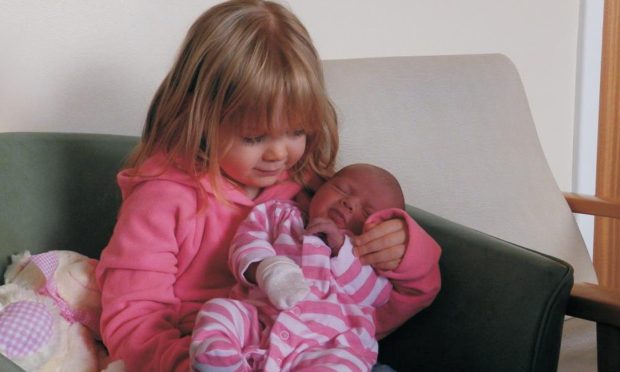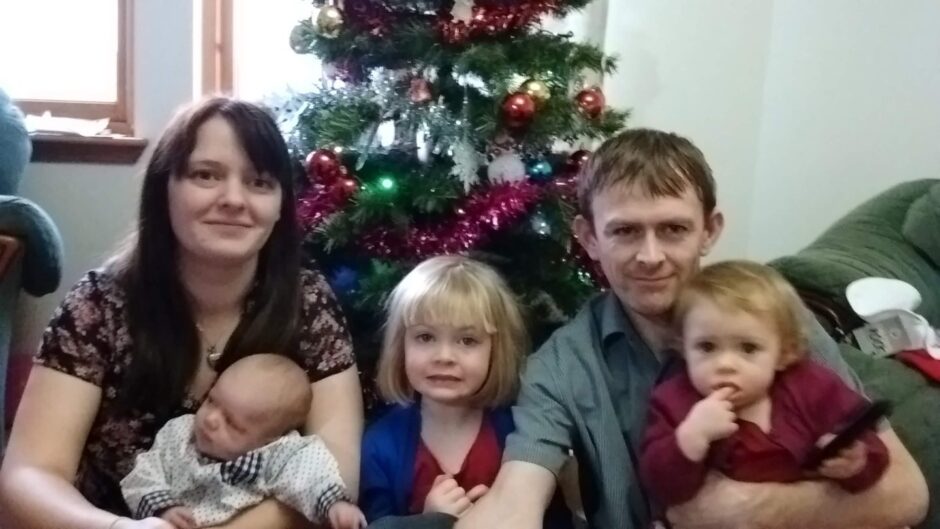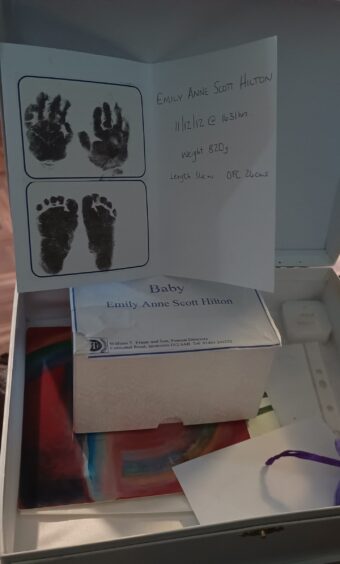It took a while for Nina Hilton to appreciate her memory box.
When she left hospital with it in her arms instead of a newborn baby, she couldn’t bear to look at it.
It all felt so incredibly cruel.
But as Nina prepares to light a candle to honour the daughter she lost, things feel different.
The memory box is the work of Simba, a charity which aims to help parents through the pain of losing a child by gathering a collection of memories from the time they spent together.
“It felt like a punch in the gut to be walking out with the memory box instead of my baby,” Nina said.
“At the time, I felt disgusted by it. I didn’t want to look at it.
“But now I’m so grateful to Simba for it. Because otherwise, we’d have nothing.”
A difficult pregnancy
Nina and her husband Joseph welcomed their daughter Marina into the world in December 2010.
She was such a ray of sunshine in the Ullapool family’s lives that they were desperate to give her a sibling.
Unfortunately, the path to that dream was a rocky one.
After suffering a miscarriage at 10 weeks, Nina was delighted to fall pregnant again shortly after in early 2012.
It quickly became clear that this pregnancy would not be smooth sailing either.
A bleed at 12 weeks convinced her she’d lost the baby and another scare happened at 16 weeks.
At 20 weeks, doctors discovered that her baby had very little fluid around her.
This meant she was at risk of having a club foot, a misshapen head or being born prematurely.
Nina was offered a termination at this point but she felt that her baby was fighting, so she couldn’t face giving up on her.
She went into false labour at 22 weeks and was shuttled by ambulance down to Ninewells Hospital in Dundee, a journey that took nearly four hours.
It didn’t progress, so back to Ullapool she went.
The trauma of stillbirth
When Nina did go into labour for real, her pregnancy had progressed long enough that medics felt comfortable enough to keep her in the Highlands at Raigmore Hospital in Inverness.
But at 28 weeks and four days pregnant, her baby was still very premature.
The high number of hospital admissions Nina had endured meant her medical notes were a mess and several of her wishes were ignored.
Four minutes before Emily Hilton was born, doctors couldn’t find a heartbeat.
Attempts to resuscitate her failed.
The sudden nature of the labour meant Joseph was working away from home and not able to arrive at the hospital in time, leaving Nina to face the ordeal on her own.
“It was an incredibly horrific and traumatic experience,” she said. “I was just numb until the funeral. My husband and I just both broke down at that point.
“We had a year of just pushing through for our daughter. That was really hard, but we made it.”
‘We still miss her every day’
After waiting a year before trying again, further heartbreak for the Hiltons followed when Nina had a second miscarriage at six weeks.
But they were determined to keep going and their rainbow baby Emma was born in November 2014.
Remarkably, their good luck continued and their son Lachie was born 11 months after Emma in October 2015.
“We still miss Emily every day,” Nina said. “At the time, we didn’t think about making any kind of memories, you’re just distraught and in shock.
“Now we have a wee shelf with pictures and a candle that we light on her birthday and for the wave of light every year.
“That’s thanks to Simba.”
When it comes to coming to terms with what happened, Nina has found opening up about it to be a huge help.
Several online Facebook groups have proved invaluable and hearing from others who’ve been through similar experiences has helped a lot.
Being open even extends to Nina’s own children.
“When I was pregnant with Emma, Marina asked me what happened to the other baby in my tummy.
“If she showed no signs of remembering, I never would have brought it up. But knowing that she did, I had to be up front with her.”
Advice for surviving through this? Be kind to yourself
That process of being open isn’t likely to happen overnight, however.
Nina believes that taking the time to grieve and be kind to yourself is an important part of it.
She said: “I wanted to hide away at the start. I didn’t want to go anywhere, I didn’t want to talk to anyone.
“You have to just take it a day at a time, I always tell people ‘be kind to yourself’.
“You have to get used to a new normal. You’ll never forget your baby, but it will get easier.”
Baby Loss Awareness Week and how you can help
Baby Loss Awareness Week is a safe space for anyone touched by pregnancy and baby loss to share their experiences and feel that they are not alone.
It runs from October 9 to 15.
The week finishes with the global “wave of light”, a globally-recognised event.
Families are invited to light a candle at 7pm local time and leave it burning for at least one hour to remember all babies that have died too soon.
Simba is a charity which honours babies who have died, been stillborn or miscarried.
Vanessa Rhazali, the charity’s head of fundraising and communications, said: “Baby Loss Awareness Week aims to unite the pregnancy and baby loss community by reaching out to spread awareness of the impact of bereavement and remembering all babies lost.
“Having supported over 55,000 bereaved families since 2005, Simba is proud to be part of the movement this week.”
To find out more about the charity or to help support the important work they do, follow this link.




Conversation